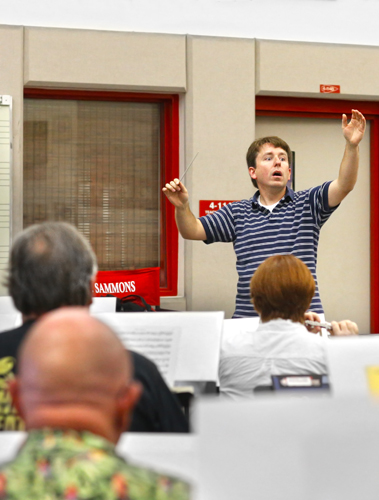
All day long, Page Howell listens to high school kids learn to play music. Associate band director of Vero Beach High School, he team-teaches 200 kids in the school’s marching band, jazz band and symphonic band. And on the side, he conducts the Vero Beach Chamber Orchestra, the all-volunteer, mostly amateur community orchestra that sells itself with the motto: “So take it off the shelf and play!”
There is one group, though, that he created for himself: The Treasure Coast Wind Ensemble, made up of skilled musicians who want to play challenging music.
Friday evening, for the seventh year in a row, his yen for fine music-making will be sated, he hopes, as he conducts his ensemble in a free program of music written specifically for brass, wind and percussion.
Howell isn’t shy about praising his musicians, many of whom draw a “grass roots following” through Facebook and flyers, enough to fill a good-size portion of the high school’s Performing Arts Center.
“It’s summer, so it’s not huge, but we usually get 200 to 300,” he says. “I will tell you, it is incredible, the level of the ensemble and the musicality of the players. It’s incredible.”
“This was my brainchild,” says Howell, who plays clarinet and saxophone. “I wanted to do a group that would give professional and semi-professional musicians and band directors an opportunity to play in a wind group that was not your ‘community band,’ so to speak. To play in an ensemble of a caliber of what they played in in college, with that type of repertoire.”
Howell studied conducting and clarinet at UNC-Greensboro, and earned a master’s degree at Louisiana State University. He came to Vero eight years ago.
By his second season here, he was already well connected enough to pull the wind ensemble together.
“There were people who thought this wouldn’t work because we’re so isolated here,” he says. “But through my contacts as a high school band director and my association with the Florida Bandmasters Association, I just put the word out that I was looking for the best of the best wind players.
“Over the years, with the musicians around here, it’s gotten a reputation. We have people come from as far north as Titusville and as far south as Palm Beach County.”
Because it is a wind ensemble and not a symphonic band, the selection of instruments and the number of musicians varies according to the repertoire, within the same performance.
At Friday’s concert, for example, there will be 50 players performing Hindemith’s “Symphony in B flat,” the 1951 work of the German composer that is among the best-known works for wind ensembles. Following that piece is a set change, with chairs rearranged for only eight musicians; they will play Beethoven’s Wind Octet. That will be followed by “Fanfare,” a work for brass and percussion by Karel Husa, a Pulitzer-prize winning Czech composer. In that piece, the ensemble will include 13 players.
Among the musicians are Bob Hill, a retired band director who plays trumpet and frequently plays in local churches, including First Presbyterian in Vero. Lincoln Park Academy’s Jason Albert, who lives in Vero, plays in the ensemble, as does Jennifer Royals, who plays principal clarinet in both the wind ensemble and the Vero Beach Chamber Orchestra; she gives lessons privately.
Royals is one of a few musicians who also play in under Howell’s baton in the Vero Beach Chamber Orchestra, mostly in the bassoon section. A wind ensemble can also include strings – there are many in the community orchestra. So far, the wind ensemble hasn’t needed any.
“‘Wind ensemble’ is a term that is not familiar to a lot of people. They see it and say, ‘Isn’t that a band?’ The answer is yes and no. The sound a wind ensemble makes is somewhat different from a symphonic band. They may both have 60, 70, or 80 players. But in a wind ensemble, it’s usually one player on a part and that’s a different sound.”
The ensemble repertoire can offer flexibility in its instrumentation, sometimes only needing a dozen musicians as opposed to all 70 or 80. “I enjoy that,” says Howell.
“And it’s a different type of literature than symphonic band literature, even though they would play some of the same repertoire. I love symphonic sound – that’s my bread and butter. But it’s nice to play something different.
“We usually play stuff that is a little more advanced than I would play with the high school students. For me as the conductor, it’s a challenge musically. It’s working with adult musicians that are fine players. I really enjoy that.”
The musicians rehearse as professionals would – not very much, since professionals are paid for rehearsal time; they’re expected to catch on quickly. That, says Howell, is a refreshing change. “We can focus more on playing instead of me teaching somebody how to play. I’m used to having to conduct kids who are still learning.”
His job at the high school includes administrative duties like issuing instruments, handling the sheet music, taking care of equipment and passing out uniforms.
As for how much Howell himself gets to play, not enough, he says. His last gig was playing clarinet to accompany the Indian River Charter High School choir. Not exactly soul-satisfying for a man whose love is jazz. “I don’t play as much as I would like to anymore,” he says.
The Treasure Coast Wind Ensemble plays Friday, June 20, at 7 p.m. (sharp!, says Howell.) The concert is free, but donations are appreciated to defray the expense of playing in the high school’s Performing Arts Center.



